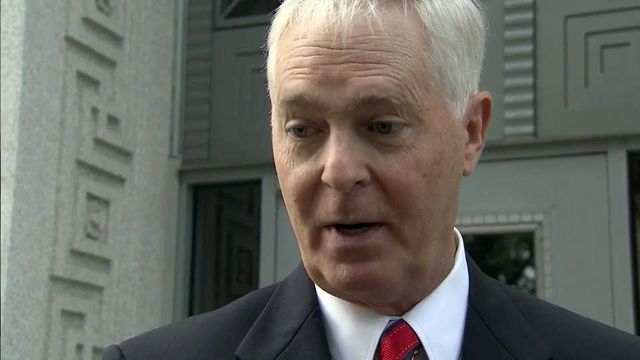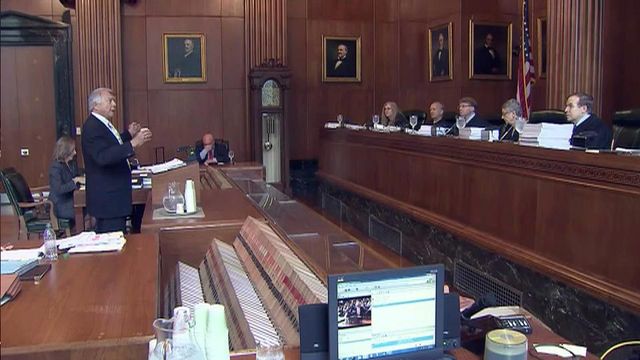Schools say NC cannot ignore pre-kindergarten commitment
The North Carolina Supreme Court hears oral arguments in a case that could require the state to open up its NC Pre-K program to every needy 4-year-old who applies, which some have estimated could cost the state $300 million a year.
Posted — UpdatedThe plea came during oral arguments before the North Carolina Supreme Court in a case that could require the state to open up its NC Pre-K program to every needy 4-year-old who applies, which some have estimated could cost the state $300 million a year – more than double what it now spends.
Superior Court Judge Howard Manning, who has handled school funding cases for years, ruled in 2011 that the state couldn't restrict access to NC Pre-K, which was known then as More at Four. The state Court of Appeals upheld that decision last year.
John Maddrey, an appellate lawyer for the state Attorney General's Office, argued Tuesday that both Manning and the appeals court went against a 2004 Supreme Court ruling that said there is no constitutional right to pre-kindergarten classes. The state created the More at Four program that same year only to address the needs of poor students in Hoke County that were raised in that case, he said, noting that Manning then used "expansive language" to mandate it statewide.
"It's clear that the state has a statewide system of pre-kindergarten services," Maddrey said. "What it does not have is a universal, all-inclusive, expansive program sufficient to serve up to 67,000 enrollees, and that's what the trial court's order in this case requires."
NC Pre-K enrolled about 25,000 children in 2012, down from about 35,000 in 2010 after lawmakers cut its funding by 20 percent and imposed other restrictions. A September 2012 survey found that nearly 12,000 children were waiting for Pre-K services. It's unclear how many children are in the program this year.
Justices quizzed Maddrey about the development of More at Four, noting that lawmakers and the administration of former Gov. Mike Easley came up with the program to help settle some issues in the long-running Leandro lawsuits – they're named for the family that first sued over inequitable school funding.
Maddrey responded that creating More at Four doesn't create an obligation for the state to fund it for everyone, although providing such access would be an ultimate goal if funding were available.
Melanie Dubis, an attorney for the school districts, scoffed at that suggestion, saying that, if universal access is just an aspiration, state officials are violating the North Carolina constitution, which calls for equal education for all students.
"The state is saying ... we aspire to it, we’ll get around to it, it’s on our to-do list, eventually, maybe, to remedy a constitutional violation," Dubis said.
She also disputed Maddrey's claim that More at Four was designed only for Hoke County, saying other poor districts never sued the state over pre-kindergarten because of the program was being implemented statewide.
"The state did fashion a remedy to meet the constitutional deficiency that this court found with respect to at-risk 4-year-olds," she said. "The state, having chosen that remedy of access to at-risk 4-year-olds, cannot now disregard the mandates of Leandro II and bar access to that remedy."
The State Board of Education sided with the poor districts in the case, and attorney Jim Exum, a former Supreme Court chief justice, said state officials haven't come up with another plan to aid at-risk students, so they must allow anyone eligible for NC Pre-K to enroll.
"They did not commit to a mere plan or a mere program that the state could willy-nilly provide and take away," Exum said. "They committed to a remedy – a remedy for a constitutional violation that this court identified in Leandro II.
"The defendants can always come up with another remedy, but until they come with another remedy, they can't abrogate or denigrate or take away the one they've chosen," he said.
Easley, who was part of the standing-room only crowd for the hearing, filed a brief with the court supporting the expansion of NC Pre-K. Afterward, he said the early classes are a model for the nation, having closed the achievement gap among poor students by 60 percent.
"This isn't just a matter of the economy and education. This is a chance for every child to reach their God-given potential," Easley said. "You have to recognize young children are perishable commodities, and you can’t just sit them on the shelf for two years and hope for better economic times. You find the money."
• Credits
Copyright 2024 by WRAL.com and the Associated Press. All rights reserved. This material may not be published, broadcast, rewritten or redistributed.






